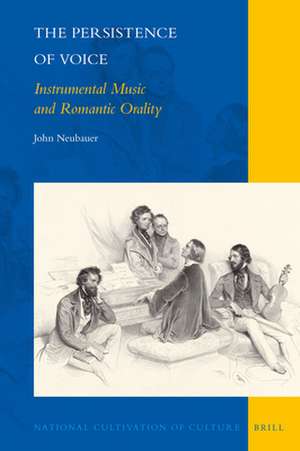The Persistence of Voice: Instrumental Music and Romantic Orality: National Cultivation of Culture, cartea 14
Autor John Neubaueren Limba Engleză Hardback – 19 iul 2017
Din seria National Cultivation of Culture
-
 Preț: 352.03 lei
Preț: 352.03 lei - 18%
 Preț: 630.45 lei
Preț: 630.45 lei - 18%
 Preț: 601.58 lei
Preț: 601.58 lei - 25%
 Preț: 520.51 lei
Preț: 520.51 lei - 18%
 Preț: 657.88 lei
Preț: 657.88 lei - 18%
 Preț: 608.49 lei
Preț: 608.49 lei - 18%
 Preț: 727.88 lei
Preț: 727.88 lei - 18%
 Preț: 576.85 lei
Preț: 576.85 lei - 18%
 Preț: 684.39 lei
Preț: 684.39 lei - 18%
 Preț: 761.10 lei
Preț: 761.10 lei - 18%
 Preț: 699.78 lei
Preț: 699.78 lei - 18%
 Preț: 520.92 lei
Preț: 520.92 lei - 18%
 Preț: 731.65 lei
Preț: 731.65 lei - 18%
 Preț: 600.54 lei
Preț: 600.54 lei - 18%
 Preț: 645.03 lei
Preț: 645.03 lei - 18%
 Preț: 565.94 lei
Preț: 565.94 lei - 18%
 Preț: 600.54 lei
Preț: 600.54 lei - 18%
 Preț: 625.25 lei
Preț: 625.25 lei - 18%
 Preț: 654.22 lei
Preț: 654.22 lei - 18%
 Preț: 808.19 lei
Preț: 808.19 lei - 18%
 Preț: 843.14 lei
Preț: 843.14 lei - 18%
 Preț: 691.33 lei
Preț: 691.33 lei - 18%
 Preț: 698.16 lei
Preț: 698.16 lei - 18%
 Preț: 697.43 lei
Preț: 697.43 lei - 18%
 Preț: 637.07 lei
Preț: 637.07 lei
Preț: 656.72 lei
Preț vechi: 800.88 lei
-18% Nou
Puncte Express: 985
Preț estimativ în valută:
125.70€ • 136.59$ • 105.66£
125.70€ • 136.59$ • 105.66£
Carte indisponibilă temporar
Doresc să fiu notificat când acest titlu va fi disponibil:
Se trimite...
Preluare comenzi: 021 569.72.76
Specificații
ISBN-13: 9789004343351
ISBN-10: 9004343350
Pagini: 290
Dimensiuni: 155 x 235 x 23 mm
Greutate: 0.57 kg
Editura: Brill
Colecția Brill
Seria National Cultivation of Culture
ISBN-10: 9004343350
Pagini: 290
Dimensiuni: 155 x 235 x 23 mm
Greutate: 0.57 kg
Editura: Brill
Colecția Brill
Seria National Cultivation of Culture
Notă biografică
John Neubauer (Budapest 1933 – Amsterdam 2015) was Professor of Comparative Literature at the University of Amsterdam. Among his works are The Emancipation of Music from Language (1986), The Fin-de-siècle Culture of Adolescence (1992) and the four-volume History of the Literary Cultures of East-Central Europe (4 vols., ed. w. M. Cornis-Pope, 2004-10).
Cuprins
PrefaceWords of ThanksList of AbbreviationsList of IllustrationsIntroductionRetelling the Fifth Absolute or Emancipated Music? Part 1: The New Discourses Part 2: Romantic Orality
